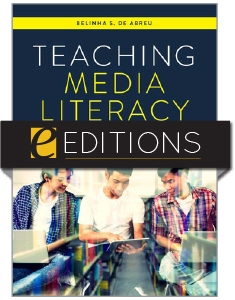
Primary tabs
You don't need to be an ALA Member to purchase from the ALA Store, but you'll be asked to create an online account/profile during checkout to proceed. This Web Account is for both Members and non-Members. Note that your ALA Member discount will be applied at the final step of the checkout process.
If you are Tax-Exempt, please verify that your account is currently set up as exempt before placing your order, as our new fulfillment center will need current documentation. Learn how to verify here.
- Description
- Table of Contents
- About the author
- Reviews
Read a blog post by the author now!
Foreword by Michelle Ciulla Lipkin, Executive Director, National Association for Media Literacy Education
Preface by Denise E. Agosto
Though media literacy and information literacy are intertwined, there are important differences; and there has never been a more urgent need for an incisive examination of the crucial role librarians and other educators can play in teaching the skills necessary to access, analyze, evaluate, and create media. Media literate youth and adults are better able to understand the complex messages emanating from television, movies, radio, the internet, news outlets, magazines, books, billboards, video games, music, and all other forms of media. In this book, international expert De Abreu melds advice from a diverse array of practitioners and subject experts with her own research findings to examine how consuming media and technology impacts the learning of K–12 students, tackling such paramount issues as
- fake news/alternative facts;
- critical thinking
- digital literacy and digital citizenship;
- social inclusion and equity;
- global interconnectivity; and
- social justice and advocacy.
Inside, readers will find a wealth of intelligently crafted, ready-to-use lesson plans and activities designed to help promote critical thinking skills for K-12 students, making this a perfect teaching resource for school and public librarians, educators, and literacy instructors. Each group of lesson plans is prefaced by a well-informed and insightful discussion of the concept at hand along with guidance on how to best use the lesson plans, which can be freely adapted to any setting.
List of Illustrations
Foreword to This Edition, by Michelle Ciulla Lipkin
Foreword to the First Edition, by Barry Duncan
Preface, by Denise E. Agosto
Acknowledgments
Introduction
Part I: Exploring Media Literacy
Chapter 1 Media Literacy: The Key to Critical Thinking
- Reflection: Media Education and Critical Thinking: A Multimodal Approach to Flying Saucers and #Fakenews, by Pam Goble, Ryan Goble, Ben Peterselli, and George Wedel
Chapter 2 Media and Information Literacy Crossover (UNESCO)
- Reflection: Conceptual Convergence of Media and Information Literacy (MIL), by Marcus Leaning
Chapter 3 Fake News and Alternative Facts
- Reflection: Navigating Information in the Era of Fake News and Alternative Facts, by Kathleen Currie Smith
Chapter 4 Perspective, Perception, and Point of View
- Reflection: Leading and Learning through Perspective, Perception, and Point of View, by Joanna Marshall
Chapter 5 Digital Citizenship, Privacy, and Digital Leadership
- Reflection: Digital Citizenship in the Classroom: A Student and Practitioner Perspective, by Marialice B.F.X. Curran and Curran Dee
Chapter 6 Digital Literacy
- Reflection: Digital Literacy in the Elementary Classroom, by Emily Soler
Chapter 7 Technology as a Tool for Social Inclusion and Transmission
- Reflection: From Computing to Community, by Ryan Goble, James Hultgren, Michael Roethler, and Nessa Slowinski
Chapter 8 Equity vs. Equality
- Reflection: Equity and Equality in the Media: Giving Voice to the Voiceless, by Jimmeka Anderson
Chapter 9 Global Connections
- Reflection: Global Issues in a Global Village, by Neil Andersen
Chapter 10 Social Justice and Advocacy
- Reflection: Social Justice: Teaching the Ability to Treat Others with Respect, Compassion, and Dignity, by Michael Godbout
Part II: The Major Formats of Media: Ready-to-Teach Lessons
Chapter 11 Providing Media Literacy Education in the Library and Classroom
Chapter 12 Television: From News, Sitcoms, and Dramas to Reality TV
Chapter 13 Movies: Entertainment and Authentic Learning
Chapter 14 Photography and Images: Capturing Moments in Time
Chapter 15 Music and Radio: Table-Turning in the Classroom
Chapter 16 Advertising: Sell and Tell
Chapter 17 Media Production and Other Digital Technologies
Part III: Resources for Teaching Media Literacy
- Appendix A Glossary
- Appendix B Timeline of Media Literacy Education
- Appendix C Movies on the Media
- Appendix D Media Literacy Resources
About the Author and Contributors
Index
Belinha S. De Abreu, Ph.D.
Belinha S. De Abreu, PhD. is a global media literacy educator and served as an international expert to the Forum on Media & Information Literacy for UNESCO's Communication & Information Section. Her research interests include media and information literacy education, educational technology, global perspectives, critical thinking, privacy & big data, young adults, and teacher training. Dr. De Abreu is the founder of the International Media Literacy Research Symposium which has been held in the USA and Portugal and the World Media Literacy Forum. She serves as the President of the International Council for Media Literacy (IC4ML) formerly known as National Telemedia Council (NTC). IC4ML also produces The Journal of Media Literacy. Her other publications include Mobile Learning through Digital Media Literacy. She is also the recipient of the 2021 National Association for Media Literacy Education Research Award. For more information, visit belinhadeabreu.com.
"Presents a way of thinking about becoming media-savvy beyond simply checking sources and relying on authoritative resources ... Includes ready-to-teach lessons that are expertly crafted."
— Education Libraries
"Offers a solid framework for understanding media literacy and its related issues that will be of value to school librarians and teachers new to the concept or who need to make the case for teaching media literacy to skeptical colleagues or parents."
— Against the Grain


